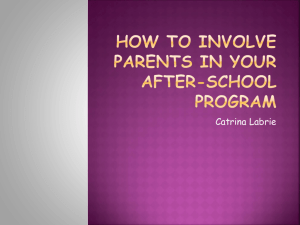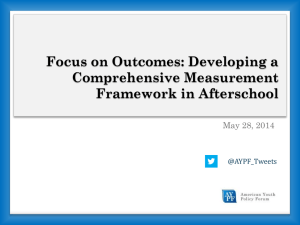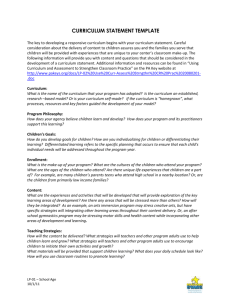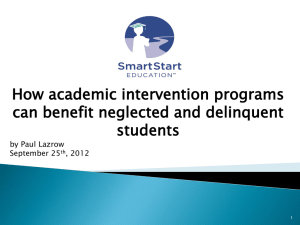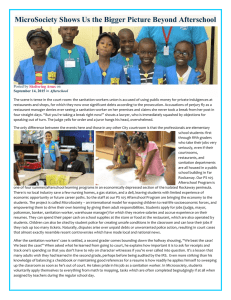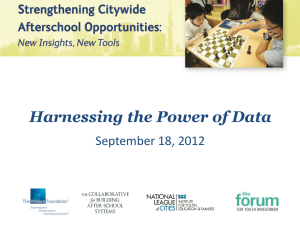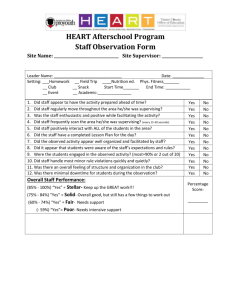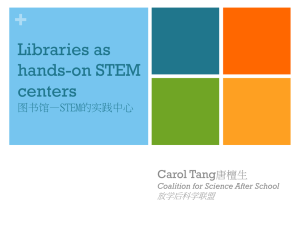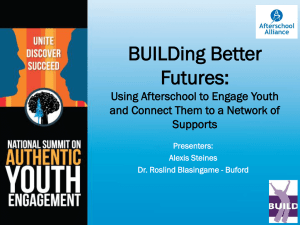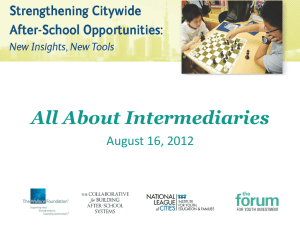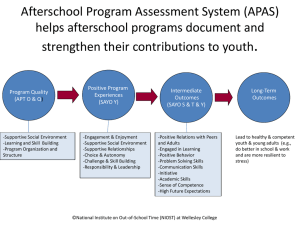October 2013 - American Youth Policy Forum
advertisement
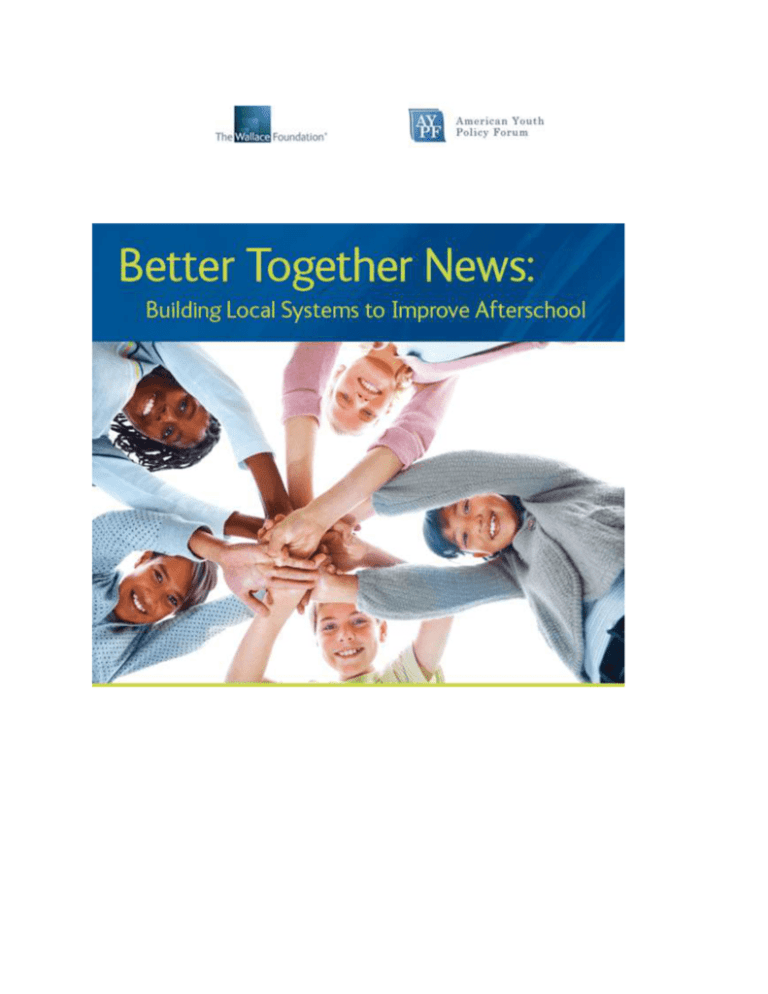
This edition of our e-blast will share some exciting opportunities to grow and develop your system-building work. Events and News of Interest CBASS WEBINAR SERIES on October 28th and November 19th Steal This Message: Explaining the Value of Expanded Learning Systems and Intermediaries. Have you ever sat down with your schools superintendent or local funder and struggled to describe exactly what an “after-school system” is? We have, too. But luckily, the Collaborative for Building After-School Systems (CBASS) has been working with a communications consultant to develop clear, effective messaging that defines and explains the value of expanded-learning systems and intermediaries. Drawing from the expertise of our national coalition partners and over a dozen stakeholders from the policy, expanded learning, funding, and school leadership fields, we developed a messaging guide to help systems and intermediaries better make the case for their work to diverse audiences. Join CBASS on Monday, October 28th from 3-4pm ET for a webinar to hear what we discovered through stakeholder interviews and field-testing, and learn how you can use these messages. Speakers include Susan Brenna, Chief Communications Officer, ExpandED Schools by TASC; Jessica Donner, Director, Collaborative for Building After-School Systems; Kara Marchione, Vice President, Penn Hill Group; and Andrea Sussman, Vice President, KSA Plus Communications. To Register: https://expandedschools.webex.com/expandedschools/onstage/g.php?t=a&d=666581277 Coordinate This: Afterschool Across Cities. A growing number of cities are making use of coordinated after-school systems to support and increase access to high-quality programs. But to what extent are these cities adopting the key components of coordination? And how does the commitment of a mayor or major funder affect the quality of their work? A recent study by FHI 360 and The Wallace Foundation offers some answers. Join the Collaborative for Building After-School Systems, in partnership with The Wallace Foundation and National League of Cities Institute for Youth, Education and Families, for a discussion on Tuesday, November 19th from 2-3pm ET of the report findings and what they mean for systems builders. You’ll hear what mayoral support has meant for coordination of after-school in Nashville; how Boston focused energy and investments to build public-private partnerships; and what the role of local foundations is in supporting system infrastructure. Speakers include Jessica Donner, Director, Collaborative for Building After-School Systems; Candy Markman, Director, Mayor’s Afterschool Initiatives, Nashville; Nina Sonenberg, Communications Officer, The Wallace Foundation; and Chris Smith, Executive Director, Boston After School & Beyond . Additional speakers to be confirmed. To Register: https://expandedschools.webex.com/expandedschools/onstage/g.php?t=a&d=664503066 MetLife Foundation Afterschool Innovator Award. There is still time to nominate a program by Oct. 14, 2013, for their chance to win $10,000, receive media recognition as an Afterschool Innovator, present at national conferences, and be featured in our 2013-2014 series of issue briefs and our Afterschool in Action Compendium. Categories include 1) Keeping Kids Safe and Supported in the Hours After School; 2) The Role of Afterschool and the Common Core State Standards; 3) Students with Disabilities and Other Special Needs and Afterschool; and 4) Why Data Matters: How Afterschool Programs Use Data to Improve Programming. NLC 2013 Summit on Your City’s Families. City leaders can register now for the nation’s largest gathering of municipal leaders working to improve the lives of children, youth and families in their communities. Sponsored by the National League of Cities Institute for Youth, Education and Families on a biennial basis, the Summit will take place November 12-14, 2013, in Seattle, Washington. A peer networking session on afterschool will be held at the summit and will highlight many afterschool system building efforts. Hundreds of mayors, city councilmembers, senior municipal staff, and school and community partners will gather in Seattle to take advantage of a unique mix of learning, training and networking opportunities. This year, a redesigned and highly interactive Summit will immediately precede NLC’s Congress of Cities and Exposition, giving local leaders the option of participating in both events. For additional details and registration, please visit www.nlc.org/2013Summit. NSLA Annual Conference. The National Summer Learning Association’s 10th annual conference on November 11-13, 2013 in Orlando, FL, "Advancing Outcomes for Youth: Demonstrating Your Value in a Data-Driven Age,” encourages presenters and participants to explore the best ways to collect data, track progress, and make the case for summer learning to funders, policymakers, and the public. The Power Session, “7 Steps to a Terrific Summer Learning Program,” will feature lessons from RAND’s latest research and a perspective from a district in Wallace’s five-year demonstration project. For additional details and registration, please visit the National Conference on Summer Learning registration page. Summer Starts in September: A Comprehensive Planning Guide for Summer Learning Programs. A 200-page guide full of research-based strategies, program examples and tools that summer program leaders, staff and trainers can use to develop an intentional, high-impact program. The guide is brought to life by 80 summer learning quality indicators, developed and tested through years of partnership with summer learning programs, researchers and trainers. Together, these indicators make up the Comprehensive Assessment of Summer Programs (CASP). Invite Others! Thanks to all of you once again for participating in the conference. We are excited to help facilitate your current work through regular communications and a series of events related to key conference themes. We also encourage you to share this e-blast with others in your community who can benefit from ongoing resources. Feel free to forward this email to others and invite them to sign up to participate. If you have been forwarded this email and would like to receive ongoing communications from AYPF, please email aypf@aypf.org with the subject line: Better Together. The American Youth Policy Forum, a nonprofit, nonpartisan professional development organization based in Washington, DC, educates and informs policymakers, practitioners, and researchers working on education, workforce, and youth issues at the national, state, and local levels. AYPF has had a long history and involvement with afterschool issues and continues to work with national, state, and local policymakers and practitioners to continue to build and deepen knowledge, understanding, and support of expanded learning, afterschool, and summer programs for adolescent youth and of school-community partnerships. For more information on our work in afterschool and expanded learning, please visit: http://www.aypf.org/programareas/ afterschoolexpanded-learning/ The Collaborative for Building After-School Systems (CBASS) is a coalition of leading expanded learning intermediary organizations representing cities and regions across the country. CBASS works to expand the availability of high-quality learning opportunities, including after-school, summer and expanded-learning programs, that help children gain the skills, knowledge and experiences they need to lead successful lives. CBASS is a leading source for news, resources, and best practices in after-school and systems-building. Stay connected to CBASS’ growing network of systembuilders and upcoming events through the listserv and quarterly e-news and at www.afterschoolsystems.org. The Forum for Youth Investment is a nonprofit, nonpartisan "action tank" dedicated to helping communities and the nation make sure all young people are Ready by 21®: ready for college, work and life. Informed by rigorous research and practical experience, the Forum forges innovative ideas, strategies and partners to strengthen solutions for young people and those who care about them. For upcoming events and webinars, see http://www.readyby21.org/events. The David P. Weikart Center for Youth Program Quality, a division of the Forum, empowers education and human service leaders to adapt, implement and scale research validated quality improvement systems to advance child and youth development. For upcoming events and webinars, see http://www.cypq.org/projects/overview. The National League of Cities (NLC) is a national membership organization dedicated to helping city leaders build better communities. Working in partnership with 49 state municipal leagues, NLC serves as a resource to and an advocate for the more than 19,000 cities, villages and towns it represents. To learn more, visit www.nlc.org The Institute for Youth, Education, and Families (YEF Institute), a special entity within NLC, helps municipal leaders take action on behalf of the children, youth, and families in their communities. Within the afterschool program area, YEF has provided technical assistance to over 40 cities to help build their citywide afterschool systems and established the Afterschool Policy Advisors’ Network (APAN), a network of city leaders interested in learning and sharing best practices on afterschool efforts. Over the past decade, YEF has documented lessons learned and created numerous strategy guides with useful city examples and profiles. To learn more and to access these resources, please visit http://www.nlc.org/find-city-solutions/institute-for-youtheducation-and-families/afterschool. The Wallace Foundation is a national philanthropy that seeks to improve education and enrichment for disadvantaged children. The foundation has an unusual approach: funding projects to test innovative ideas for solving important social problems, conducting research to find out what works and what doesn’t and to fill key knowledge gaps – and then communicating the results to help others. Visit the Knowledge Center to learn more about their strategies, tools, and grantees.
